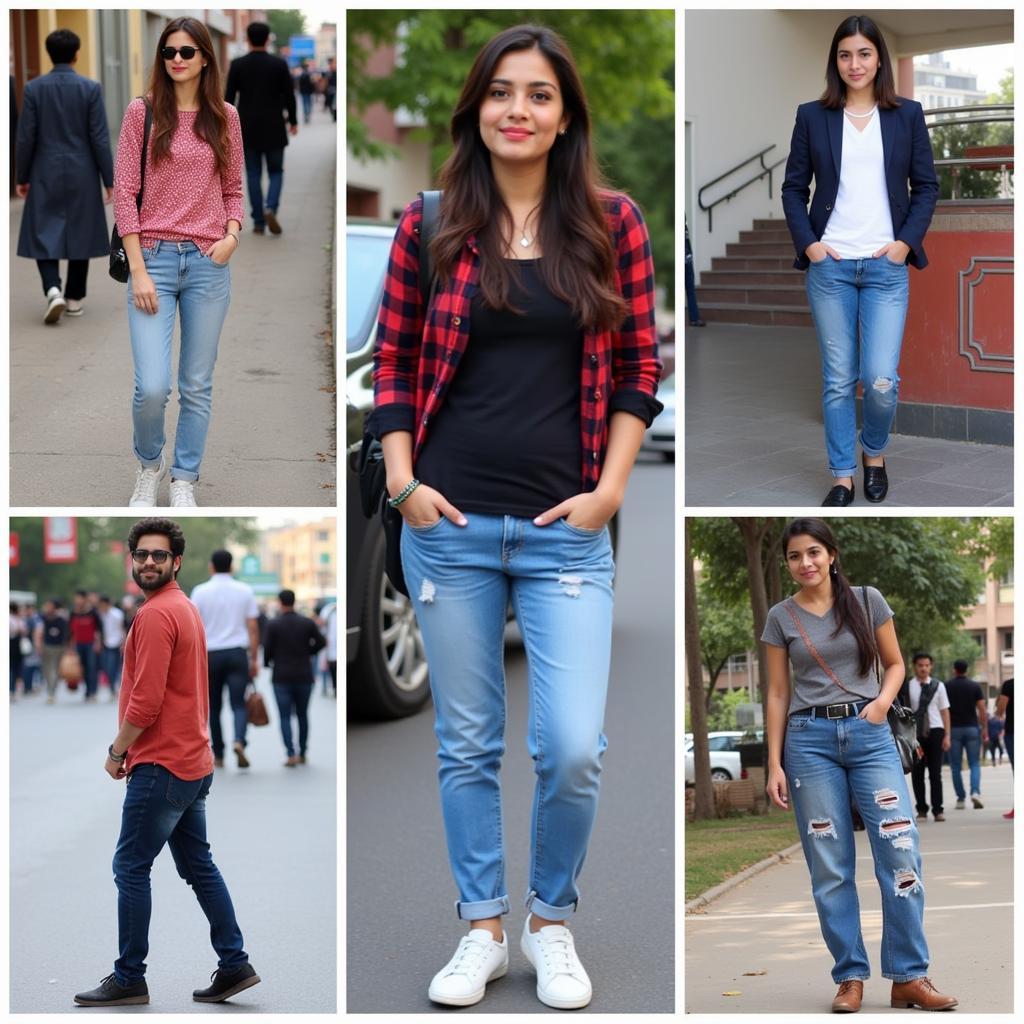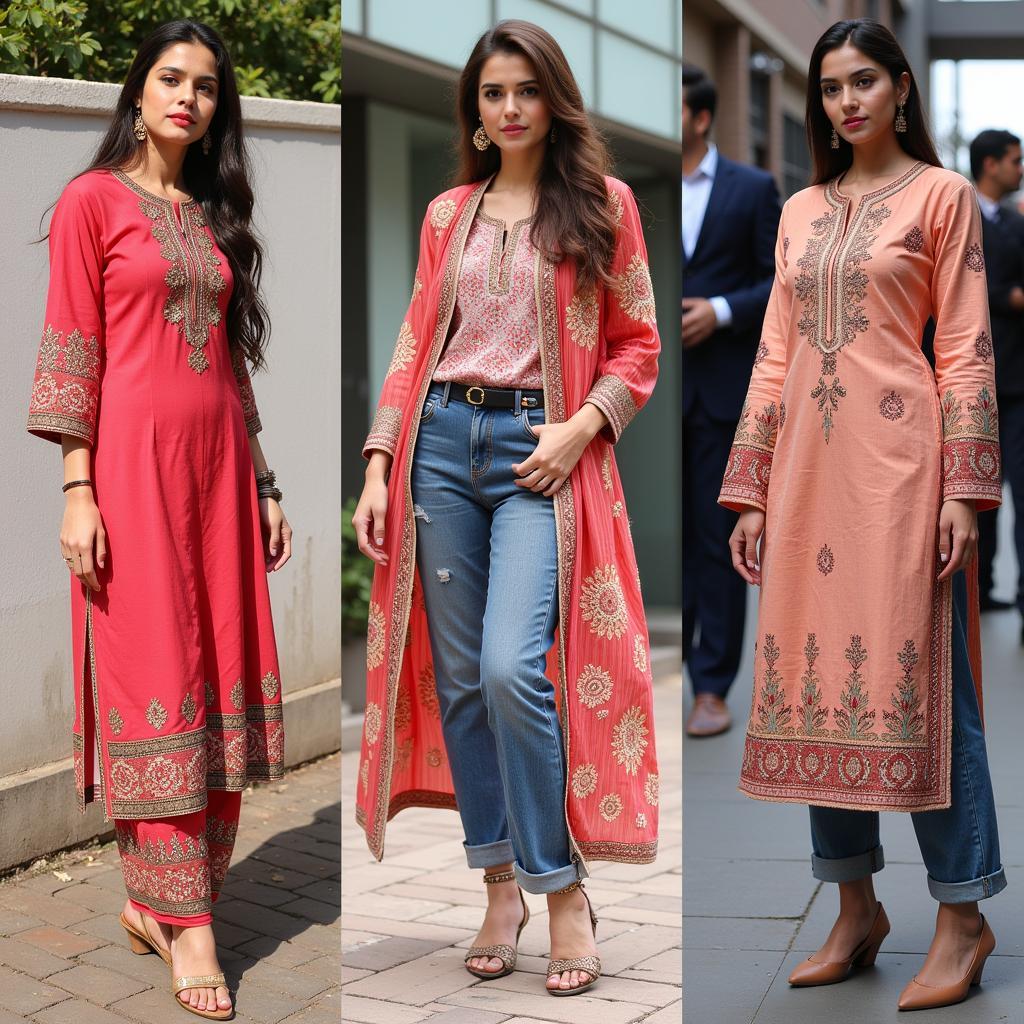The debate surrounding the Ban On Jeans In Pakistan has sparked numerous discussions, highlighting the complex interplay of culture, religion, and personal freedom. This article delves into the multifaceted aspects of this issue, exploring the reasons behind such bans, their social implications, and the varying perspectives of Pakistani society.
Understanding the “Ban on Jeans” Phenomenon
The phrase “ban on jeans” doesn’t necessarily imply a nationwide, legally enforced prohibition. Instead, it often refers to localized restrictions, primarily within educational institutions or government offices. These restrictions can range from dress code policies discouraging jeans to outright bans in certain conservative areas. Understanding this nuance is crucial to analyzing the issue’s complexity. The motivation behind these restrictions often stems from a desire to uphold traditional values and promote what is considered “modest” attire, especially for women.
For instance, some institutions might implement dress codes that encourage traditional Pakistani clothing like shalwar kameez. This isn’t necessarily about banning jeans altogether, but promoting a certain cultural aesthetic deemed more appropriate.
Social and Cultural Implications of Jeans Restrictions
The restrictions on wearing jeans, however limited, can have significant social and cultural implications. They raise questions about individual expression and the freedom to choose one’s clothing. For many, particularly the younger generation, jeans represent a globalized fashion choice, a symbol of modernity and personal style. Restrictions on such choices can be perceived as a limitation on personal freedom and an attempt to control self-expression.
Furthermore, these restrictions often disproportionately affect women, raising concerns about gender inequality and the policing of women’s bodies. The debate about appropriate attire for women is deeply ingrained in cultural and religious interpretations, adding another layer of complexity to the “ban on jeans” discussion.
 Jeans as a Symbol of Modernity in Pakistan
Jeans as a Symbol of Modernity in Pakistan
Varying Perspectives Within Pakistani Society
Pakistani society holds diverse views on the “ban on jeans.” While some support such restrictions, viewing them as a way to protect cultural values and promote modesty, others criticize them as outdated and restrictive. This divide is often generational, with younger generations generally more inclined towards embracing global fashion trends, including jeans.
“In my experience, the younger generation views jeans as a normal part of their wardrobe,” states Dr. Ayesha Khan, a sociologist specializing in Pakistani youth culture. “They don’t necessarily see it as a challenge to tradition, but rather as a comfortable and practical clothing choice.”
The debate also extends to the interpretation of religious texts and cultural norms. Some argue that the emphasis on modesty should not translate into rigid dress codes, while others believe that certain clothing choices, like jeans, are inherently immodest. This difference in interpretation further complicates the issue, highlighting the need for open dialogue and understanding.
 Evolution of Pakistani Fashion: Traditional to Modern
Evolution of Pakistani Fashion: Traditional to Modern
Navigating the Debate: Finding a Balance
Finding a middle ground in this debate requires acknowledging the validity of different perspectives. Respecting cultural sensitivities while upholding individual freedoms is crucial. Open discussions about dress codes and their implications can foster greater understanding and potentially lead to more inclusive policies. Perhaps the key lies in moving away from blanket bans and towards promoting respectful attire in a way that accommodates both cultural values and personal expression.
Conclusion
The discussion around the “ban on jeans in Pakistan” represents a larger conversation about cultural evolution, individual freedoms, and the interpretation of tradition in a globalized world. Understanding the nuances of this debate is essential for navigating the complexities of Pakistani society and fostering a more inclusive and tolerant environment. While traditions and cultural values remain important, respecting individual choices and promoting open dialogue is crucial for a harmonious society. The “ban on jeans” serves as a microcosm of these larger issues, prompting reflection on the balance between tradition and modernity in contemporary Pakistan.
FAQs about Jeans in Pakistan
- Are jeans completely banned in Pakistan? No, there is no nationwide ban. Restrictions are usually localized, often within specific institutions or regions.
- Why are there restrictions on wearing jeans? The reasons often cite cultural values and the promotion of modest attire.
- Who is most affected by these restrictions? Women are often disproportionately affected by dress code restrictions.
- What are the different perspectives on this issue? Views vary across generations and interpretations of religious and cultural norms.
- What is the best way to address this debate? Open dialogue and finding a balance between cultural values and individual freedoms are key.
- Are there similar discussions about other clothing items? Yes, discussions about appropriate attire extend to other clothing items as well, especially for women.
- How do these restrictions impact perceptions of Pakistan globally? These discussions can contribute to complex and sometimes conflicting perceptions of Pakistan on the global stage.
“Ultimately, fostering mutual respect and understanding is crucial,” adds Dr. Khan. “Finding a middle ground that respects both cultural values and individual choices is essential for moving forward.”
Looking for stylish and affordable western clothing? Check out western clothing online pakistan. You might also be interested in finding a sale on shoes brands in pakistan or looking for specific brands like Timberland Pakistan. For those interested in specific styles, explore options like chunky sneakers pakistan or designer brands like Calvin Klein Pakistan.
For further assistance, please contact us:
Phone: +923337849799
Email: news.pakit@gmail.com
Address: Dera Ghazi Khan Rd, Rakhni, Barkhan, Balochistan, Pakistan.
Our customer service team is available 24/7.